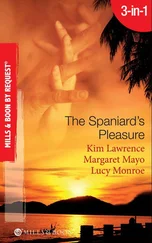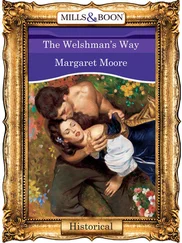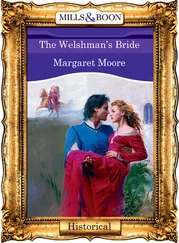Margaret Wilson - The Able McLaughlins
Здесь есть возможность читать онлайн «Margaret Wilson - The Able McLaughlins» — ознакомительный отрывок электронной книги совершенно бесплатно, а после прочтения отрывка купить полную версию. В некоторых случаях можно слушать аудио, скачать через торрент в формате fb2 и присутствует краткое содержание. Жанр: unrecognised, на английском языке. Описание произведения, (предисловие) а так же отзывы посетителей доступны на портале библиотеки ЛибКат.
- Название:The Able McLaughlins
- Автор:
- Жанр:
- Год:неизвестен
- ISBN:нет данных
- Рейтинг книги:5 / 5. Голосов: 1
-
Избранное:Добавить в избранное
- Отзывы:
-
Ваша оценка:
- 100
- 1
- 2
- 3
- 4
- 5
The Able McLaughlins: краткое содержание, описание и аннотация
Предлагаем к чтению аннотацию, описание, краткое содержание или предисловие (зависит от того, что написал сам автор книги «The Able McLaughlins»). Если вы не нашли необходимую информацию о книге — напишите в комментариях, мы постараемся отыскать её.
The Able McLaughlins — читать онлайн ознакомительный отрывок
Ниже представлен текст книги, разбитый по страницам. Система сохранения места последней прочитанной страницы, позволяет с удобством читать онлайн бесплатно книгу «The Able McLaughlins», без необходимости каждый раз заново искать на чём Вы остановились. Поставьте закладку, и сможете в любой момент перейти на страницу, на которой закончили чтение.
Интервал:
Закладка:
What he saw there made so great an impression on him, that fifty-seven years later, when that stranger’s grandson was one of the disheartened veterans of the World War who came to his office looking for work, the whole scene rose before him in such poignancy that he had to turn his head away abruptly, remembering. …
There in the kitchen, in his mother’s chair sat the stranger in the fine clothes, with a drink of whisky in his hand which his father had just poured out. There on the bed sat his great gaunt brother in blue, one trouser leg rolled up to his hairy knee. There on a strip of carpet in front of the bed knelt his mother with a strange white face, soaking bloody rags away from evil-looking sores on that precious foot. There by the cupboard stood Mary, tearing something white into bandages, with the children huddled around her, awed by the sight of their mother.
Andy saw all that the moment that Wully, taking up one of the children’s old jokes, cried out to him, in a voice that belied his foot, a greeting that the young ones had loved deriding.
“Lang may your lum reek, Andy!” There wasn’t really anything wrong with Wully, it seemed. That wasn’t a wound, he affirmed. It was only a scratch. He really couldn’t say just how it had happened. It wasn’t anything! It might not be anything to a soldier, but to his mother it was the mark of imminent death for her dearest son. She began rubbing it gently with lambs’ fat. Wully, bethinking himself, pulled from a pocket a paper-wrapped bundle of sweeties for the children, who saw such things but seldom. They were intent upon the contents of that, and the stranger was talking to his father, when Andy, still standing awkwardly in the door, saw a thing happen which was a landmark in his understanding. He saw his mother, who had made fast the last bandage, and was carefully pulling down the trouser leg, suddenly bend over and kiss that leg! Such passion he saw in that gesture that he realized vaguely then some great fierce hidden thing in life, escaping secrecy only at times, a terrible thing called love … which breaks forth upon occasions … even in old women like his mother. He turned his face away suddenly as from some forbidden nakedness, and fixed his eyes upon Wully.
That hero, quite unabashed, was pulling his mother, who had risen, down to a seat beside him on the bed. She sat there, unconscious of the roomful, just looking at him, looking … as if she could never see his face enough. She watched him devouringly when presently, with the attention of them all, he began light-heartedly telling about his escape. Half of his regiment had been made prisoners, including his major. They had been marched away towards a train, to be sent south, and he had marched among them until he dropped. He told his captors that they could shoot him if they would, but he couldn’t go a step further. They had left him lying helpless there by the roadside, a guard standing over him. And before the wagon came along, which was to pick them up, the guard had slept, and Wully, stronger to run to freedom than to march to prison, had made his escape. Starved and hiding, he had crept night by night towards the Mississippi, and there he had seen a boat which was bringing Northern wounded men home, tie up at the river bank to bury its dead. Its captain had taken pity on him, chilling and nauseated, and had brought him to Davenport. Then when he had got by train to the nearest Iowa town, this stranger had shown him this kindness. … Oh, his mother needn’t worry about his being shot for a deserter. They knew him too well in his company, if there was any of them left. And hadn’t his chum, Harvey Stow, been home four times to visit, without permission from anyone, and had he ever been punished for it? As soon as he had something to eat, and he could find where to report, he would be going back—yes, certainly—going back, however much his mother caught her breath at the mention of it.
It was so interesting to hear him talk that the men could scarcely leave for their duties. But there were the horses to feed, and the cows to milk, and the kind strange team to reward. Mr. Knight followed the boys to the barn and watched with amusement how reverently they rubbed down and bedded and fed the guests of the stable. And when they came in again, there sat the scrubbed soldier, in a fresh hickory shirt and clean jeans, in his mother’s chair, his swathed foot on a stool—the stool was Hughie’s thought—and the New York Tribune in his hand—the paper was Flora’s contribution. He was talking grinningly to his mother. A white cloth was spread on the table, and the mother, shining, uplifted with joy, was wiping pink-banded cups which Wully remembered to have seen taken from the sacred shelf only when her Scot cousin, who had come to this country to enlighten the darkness of the Yankees by taking the presidency of one of their colleges, had come west to visit this family. Not since then had the Scottish sheets been out of the chest, and now they were airing on the line. ’Twas an occasion magnificent to consider! When they sat down at the table for supper—and they had not long to wait, for the mother was that woman of whom tradition says she could make a pair of jean pants in twenty minutes—they had fried prairie chicken, and potatoes and scons and egg-butter, and stewed wild plums, sweetened with sugar at forty cents a pound. The father instituted the feast by a long prayer. “Of course!” thought the stranger. “They’re Scotch!” He counted the children. There were ten.
“You’ve a fine family,” he commented.
“Not so bad when they’re all here,” returned the mother complacently. “There’s a boy and a girl away at school.” She paused abruptly.
“Our boy younger than Wully was killed at Fort Donaldson,” explained the father.
“Ah! My son was wounded there. Lost a hand.” There was a moment’s silence. Then Wully said, wanting the subject changed,
“It’s over now, mother. Grant’ll get them now.”
They proceeded to talk of the coming election. Five families of Covenanting Scotch in the neighborhood were deserting the principles of their forefathers and taking out naturalization papers, hoping to vote for Lincoln. The visitor wondered vaguely what kind of Scotch that might be. He had no chance to ask. The mother seemed to have read every word of the last Tribune . He had hardly time for that himself. She seemed a woman of wide information. Apparently she knew the position of every unit of the army.
Supper was over. Flora handed her father The Book, and moved the candle near him. He found the place, and said,
“The twenty-third Psalm.”
To the man’s surprise, the mother began the song in a clear, sure voice, and the children all joined, without hesitation, as if this was a part of a familiar routine. The boys and girls were obviously thinking of the guests of honor. The mother’s face was turned to her son. But the father was looking away in a dream to something he seemed to see through the wall before him. When the singing was over, he began reading from The Book words that clearly had some exalted meaning to him, though what it might be the stranger could not imagine. “Lift up your heads, O ye gates, and be ye lift up, ye everlasting doors, and the King of glory shall come in. Who is this King of glory? The Lord strong and mighty, the Lord mighty in battle.” It sounded impressive, read with a subdued ring in the voice. Then he shut the book, in a high silence, and they all moved their chairs back, and knelt down. The stranger knelt, too, somewhat tardily. Not that he objected to prayers, of course. He was a religious man himself in a way. His wife often went to church. He could see the rapt face of the father praying in great, sonorous phrases which sounded vaguely familiar. Of all the children he could see, not one had an eye open. They were thanking the Lord for the boy’s return. “Bless the Lord, oh my soul, and all that is within me, bless His holy name.” They proceeded to pray for everyone in the United States, the President and his cabinet, the generals and the colonels and the captains, all the privates, all the sick and homesick, for those destroyed by war, for the mourning and all small children, for slaves in their freedom, and masters in their poverty, and then for the stranger, that he might hear the Judge say unto him, “Come, ye blessed of my Father, inherit the kingdom prepared for you from the beginning of the world. For I was sick, and ye ministered unto me”; “that the beauty of the Lord, as now, might be upon him forever.” The stranger had scarcely got over that when they all began saying the Lord’s Prayer together. “Nothing lacking but the collection,” he thought, somewhat resentfully. Not having heard a sermon for some time, he had forgotten that. When they rose from their knees, Sarah and David were found asleep. Andy picked them up and carried them away to bed. And even while Mr. Knight was wondering how many of the children he would have to sleep with, the mother took the sheets from beside the stove, and as she started for the fine parlor, whose bed was to be got ready for the guest, she said,
Читать дальшеИнтервал:
Закладка:
Похожие книги на «The Able McLaughlins»
Представляем Вашему вниманию похожие книги на «The Able McLaughlins» списком для выбора. Мы отобрали схожую по названию и смыслу литературу в надежде предоставить читателям больше вариантов отыскать новые, интересные, ещё непрочитанные произведения.
Обсуждение, отзывы о книге «The Able McLaughlins» и просто собственные мнения читателей. Оставьте ваши комментарии, напишите, что Вы думаете о произведении, его смысле или главных героях. Укажите что конкретно понравилось, а что нет, и почему Вы так считаете.












